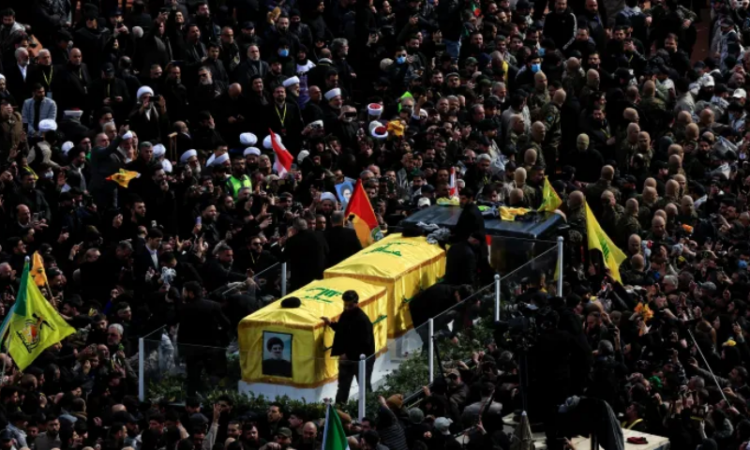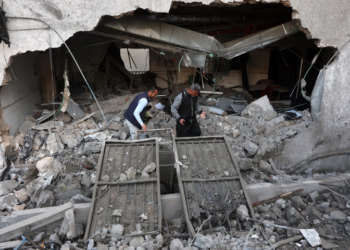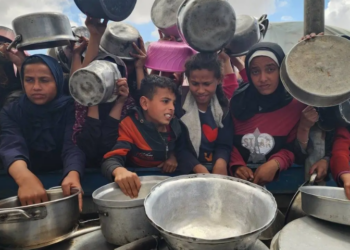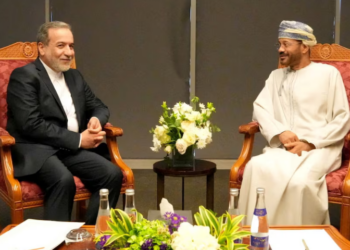Beirut, February 23, 2025: Tens of thousands of mourners, dressed in black and waving Hezbollah flags or carrying portraits of the slain leader Hassan Nasrallah, gathered in Beirut on Sunday to attend his funeral. The ceremony took place at the Camille Chamoun Sports City Stadium on the outskirts of the capital.
The killing of Nasrallah, who led Hezbollah for more than three decades, has dealt a significant blow to the Iran-backed group’s standing as a military force. However, Hezbollah has long maintained a strong support base within Lebanon’s Shia Muslim community, largely due to its extensive social and economic programs.
Despite the biting cold, men, women, and children from across Lebanon and beyond walked on foot to reach the funeral site, which had been secured following delays due to security concerns. Nasrallah was killed in a massive Israeli strike on Hezbollah’s stronghold in southern Beirut in September.
Among the mourners was 55-year-old Umm Mahdi, who expressed deep sorrow over Nasrallah’s death. “Of course, we feel sadness,” she said. “This is the least we can do for Sayyed, who sacrificed everything,” she added, using an honorific title for Nasrallah.
As the crowds gathered, Lebanese state media reported Israeli airstrikes on southern Lebanon, including an area about 20 kilometers from the border. The Israeli military stated that it had targeted “several rocket launchers that posed an imminent threat to Israeli civilians.” Israel has carried out multiple strikes in Lebanon since a ceasefire agreement with Hezbollah went into effect on November 27.
Giant portraits of Nasrallah and Hashem Safieddine—his designated successor, who was also killed in an Israeli airstrike—were displayed on walls and bridges across Beirut’s southern suburbs. One of the images was prominently placed above the stage at the stadium, where both leaders’ funerals were being held.
The stadium, with a seating capacity of 50,000, was expanded with additional seating on the pitch and in surrounding areas. Mourners who could not enter the venue followed the ceremony on a giant screen outside.
Hezbollah invited several high-ranking Lebanese officials to attend the funeral, along with Iranian Speaker of Parliament Mohammad Bagher Ghalibaf and Foreign Minister Abbas Araghchi. Speaking at the ceremony, Araghchi described the slain leaders as “two heroes of the resistance” and vowed that “the path of resistance will continue.”
Since Saturday, roads leading into Beirut have been clogged with vehicles carrying Hezbollah supporters from the group’s strongholds in southern Lebanon and the Bekaa Valley.
Khouloud Hamieh, 36, traveled from eastern Lebanon to pay her respects. “He was dearest to our souls,” she said tearfully. “Even if we had to crawl to get here, we would have come.”
The funeral was scheduled to begin at 1:00 p.m., followed by a procession to a burial site near the airport highway, where Nasrallah was to be laid to rest. Safieddine is set to be buried in his hometown of Deir Qanun al-Nahr on Monday.
Hezbollah’s Al-Manar television reported that 25,000 Hezbollah members were deployed for crowd control, while a security source stated that 4,000 Lebanese troops and security personnel were also on duty. Representatives from Iraq’s pro-Iran factions were expected to attend, and additional flights were arranged between Baghdad and Beirut. Beirut’s international airport was set to close temporarily from noon until 4:00 p.m.
To prevent celebratory gunfire—an often dangerous tradition at Lebanese funerals—Hezbollah urged mourners to refrain from shooting into the air. The Lebanese Defense Ministry also announced a temporary suspension of firearm licenses from February 22 to 25.
Nasrallah, a founding member of Hezbollah in 1982, gained widespread recognition across the Arab world in May 2000 when Israel withdrew from southern Lebanon after a 22-year occupation, following relentless attacks by Hezbollah under his leadership.
In the years since, Hezbollah’s role in Lebanon has become increasingly polarizing. While the group remains deeply rooted in the country’s Shia community, many Lebanese criticize its willingness to engage in armed conflicts with Israel, particularly in support of Palestinian group Hamas.
The latest conflict, along with nearly a year of fighting before it, has left more than 4,000 people dead in Lebanon, according to the country’s health ministry. The United Nations estimates that reconstruction costs will exceed $10 billion.








